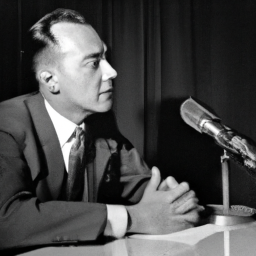In the early days of television, it was a novelty to have a president appear on screen. That all changed on April 30, 1939, when President Franklin D. Roosevelt made history by becoming the first president to be broadcast on television.
At the time, television was still in its infancy and was not yet a household staple. But that did not stop Roosevelt from recognizing its potential as a powerful communication tool. He saw television as a way to connect with the American people and to convey his message directly to them.
The broadcast was a momentous occasion, not only for the president but also for the medium of television. It marked the beginning of a new era in media history, one in which politicians could reach a broader audience than ever before.
The broadcast was not without its challenges, however. The technology was still primitive, and the picture quality was poor. But despite these obstacles, Roosevelt's message came through loud and clear. He spoke about the World's Fair, which was taking place in New York City, and encouraged Americans to attend.
The impact of Roosevelt's appearance on television was immediate. The broadcast was picked up by newspapers across the country, and it was the talk of the town for weeks afterward. It was clear that television had the power to shape public opinion and to influence politics in a way that had never been seen before.
Over the years, other presidents followed in Roosevelt's footsteps, appearing on television to deliver speeches and address the nation. But it was Roosevelt who paved the way, demonstrating the power and potential of the medium.
Today, television is a ubiquitous part of American life, and politicians are expected to appear on screen regularly. But it was not always that way. It took a bold and visionary president like Roosevelt to see the potential of television and to use it to his advantage.
